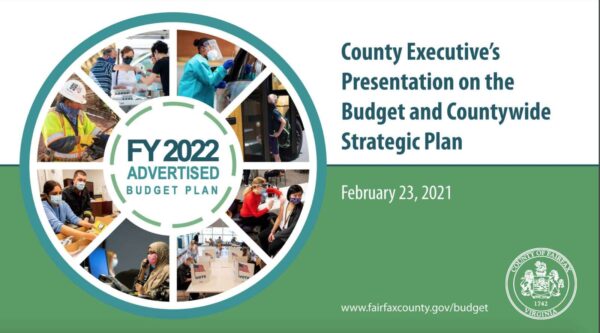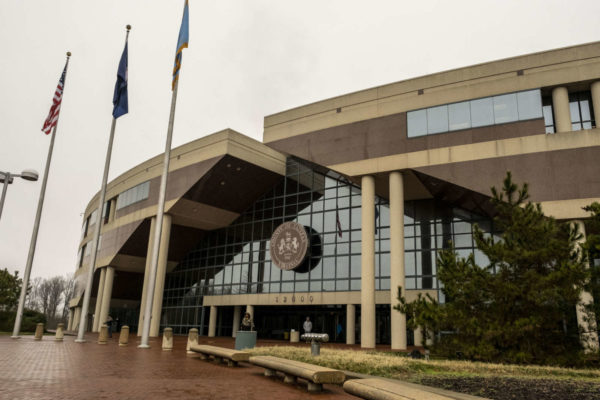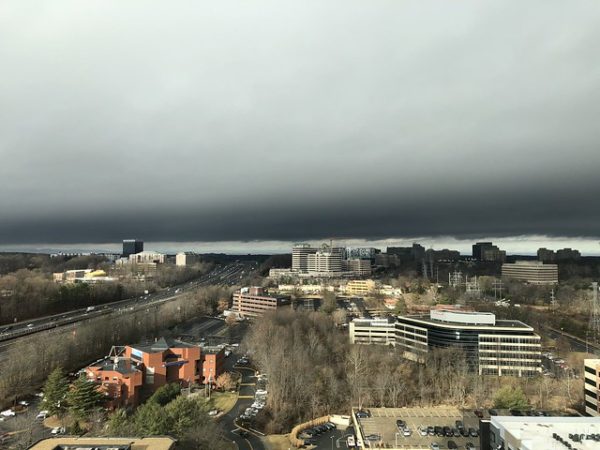
Fairfax County Gave Republican Governor Nominee Tax Break — “GOP gubernatorial nominee Glenn Youngkin and his wife last year successfully petitioned Fairfax County to designate their horse farm as an agricultural district, which led to a 95% reduction in the taxes they pay on the 31.5-acre property in Great Falls that surrounds their home.” [Richmond Times-Dispatch]
Material Costs Drive Up Silver Line Phase 2 Costs — “The Metropolitan Washington Airport Authority is having to pay an extra $20 million to cover the higher cost of materials needed to build the extension of Metro’s Silver Line…So far, the construction’s progress has eaten up $2.464 billion, but the airports authority maintains the [$2.778 billion] budget won’t change, thanks to contingency funds.” [Washington Business Journal]
County Redistricting Committee to Meet Next Week — Fairfax County’s 20-person Redistricting Advisory Committee will hold its first meeting on Tuesday (July 27) at 6 p.m. at the Fairfax County Government Center. Open to the public, the meeting will focus on legal requirements, equity, and bylaws as the group prepares to recommend new electoral boundaries for the county’s supervisor and school board districts. [Fairfax County Government]
Reston Hospital Hires New Executive — Allyssa Tobitt will serve as Reston Hospital Center’s new chief operating officer starting Aug. 2. Replacing Ben Brown, who moved to Dominion Hospital in West Falls Church, she worked at the corporate office of Reston Hospital’s parent company HCA Healthcare in Nashville, Tennessee as well as at hospitals in its for-profit health system near Miami and Tampa, Florida. [HCA]
Photo via vantagehill/Flickr
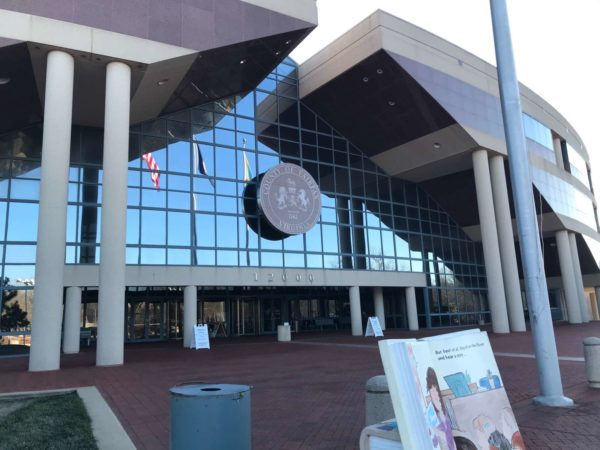
The Fairfax County Board of Supervisors won’t approve a budget for the next fiscal year until May 4, but the bulk of the work to get to that final document will be done today (Tuesday) when the board meets at 10 a.m. to mark up the proposed budget.
Unveiled during a budget committee meeting on Friday (April 23), Board of Supervisors Chairman Jeff McKay’s proposed adjustments to the advertised fiscal year 2022 budget include a small raise for county employees and support for County Executive Bryan Hill’s recommendation of a one-cent decrease in the real estate tax rate.
The proposed cut would put the tax rate at $1.14 per $100 of assessed value, but rising residential property values mean that county homeowners will still see their tax bills go up by $224 on average.
“We all know that many families are struggling because of the impacts of COVID-19,” McKay said. “While the one-cent decrease isn’t a tax reduction for most families, I chose to support it because it provides some relief to families while still allowing the County sufficient funds, particularly with the stimulus dollars, to continue to stand up the programs that I know are needed in the community.”
The county is also considering lowering its refuse disposal fee from $68 to $66 per ton, but the board has proposed increases in sewer charges and for the refuse collection fee, which would go from $370 to $400 per household.
“It should be noted that this rate was reduced last year from $385 per household based on the inability to provide yard waste collection during the pandemic,” the proposed mark-up summary says.
With Fairfax County expecting a total of $222 million in federal relief funds from the American Rescue Plan Act, McKay has suggested redirecting $20 million that Hill had recommended setting aside as an economic recovery reserve fund to instead give county government employees a 1% pay raise.
The proposed mark-up doubles the increase in transfer funds to Fairfax County Public Schools from $14.1 million to $29.3 million — mainly to cover a 2% pay raise for school employees — and includes salary supplements for state probation and parole officers and support staff in the Public Defender’s Office.
“The Board remains committed to both acknowledging the hard work of our employees and maintaining competitive salaries relative to the market,” McKay said when outlining his mark-up proposal.
The board also plans to amend in its FY 2021 third-quarter review package to include $12.6 million for one-time bonuses for employees, along with funding for Celebrate Fairfax Inc., planning studies, athletic scholarships for at-risk kids, and environmental initiatives, including a green bank and zero-waste policies.
The county government employees’ union SEIU Virginia 512 said in a statement that it was “heartened” to see the board respond to the concerns that workers raised at public hearings on the FY 2022 budget last week about the possibility of having their pay frozen for a second consecutive year.
“However, the basic fact remains: the cost of living continues to rise, while Fairfax County workers continue to fall behind,” SEIU Virginia 512 Fairfax Chapter President Tammie Wondong said. “We urge the Board of Supervisors to continue to work to fund the county’s agreed-to pay plans.”
The union has also been advocating for the Board of Supervisors to adopt an ordinance allowing county employees to engage in collective bargaining.
“A union contract would bring consistency, improve recruitment and retention, and improve services for the community,” Wondong said.
According to McKay’s office, county staff are currently drafting a proposed ordinance, and the board will discuss the issue during its personnel committee meeting on May 25.
While the mark-up package mostly focuses on employee compensation, the Board of Supervisors also hopes to address affordable housing needs by allocating at least an additional half-penny from real estate tax revenues to the county’s affordable housing fund, which currently receives one half-cent, in FY 2022 and FY 2023.
Hunter Mill District Supervisor Walter Alcorn said he was glad to see that guidance in McKay’s mark-up proposal, even if it would still fall short of the two-cent allocation he campaigned on when running for office in 2019.
“Getting us back to a penny, at least historically, has been on the agenda for a long time,” he said. “I see the federal money as the opportunity, if you will, to pay back a lot of what we weren’t able to do in some previous years, so I do want to see us get to one penny as soon as possible.”
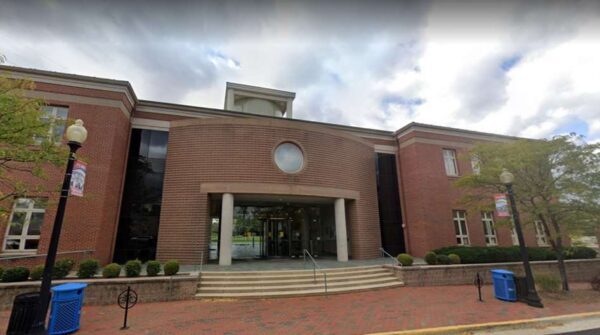
Like other localities across Northern Virginia, the Town of Herndon is taking a cautious approach to its budget proposal for fiscal year 2022, which was made public this morning (Wednesday).
Requesting $55.7 million in total expenditures, the proposed FY 2022 budget calls for a 8.7% decrease in spending compared to FY 2021 and reflects the financial toll that the COVID-19 pandemic has taken on local governments in a demanding, unpredictable year.
“The fiscal year we are now concluding has been, to put it succinctly, a year like no other,” Herndon Town Manager Bill Ashton said. “The COVID-19 pandemic upended all aspects of daily life. Town services and programs were significantly impacted, as were revenues across the board.”
According to the budget document, Ashton developed his proposal around a 1.7% uptick in assessed property tax values, including new construction and improvements. Gains in residential values, which account for 56% percent of the town’s real property tax base, were offset by dropping commercial real estate values.
The proposed budget maintains the town’s current real estate tax rate at 26.5 cents per $100 of assessed value.
While the town projects a “modest” increase in revenue from business and professional and commercial licenses, business closures and restrictions necessitated by the pandemic are expected to continue affecting revenue from Herndon’s meals and transient lodging taxes during the first half of the coming fiscal year, which starts on July 1.
Herndon saw a 20% year-over-year decrease in meals tax receipts during FY 2021 and a 75% drop in transient lodging tax receipts, according to the FY 2022 budget proposal.
Ashton says the budget “reflects the austerity under which we are still operating.”
“It focuses on core services — public works, public safety — as well as pandemic-related relief that is in the town’s jurisdiction to provide,” Ashton said. “It anticipates an improving economy, but any recovery will likely be gradual. This budget outlines a prudent response to a fiscal crisis that is very much still with us.”
While the town is anticipating “a mild recovery” in the second half of FY 2022 as COVID-19 vaccinations become more widespread and public health restrictions lift, Ashton says he asked town departments to submit budget requests at 5% and 10% reduction levels in recognition of the “fiscal uncertainty that still lies ahead.”
The proposed budget says “several essential items” had to be deferred to the next fiscal year to maintain a balanced budget, though the town council could authorize additional spending in the future depending on the town’s finances and the arrival of new federal stimulus funds.
Areas where the town plans to significantly cut back on spending include professional services, tree maintenance and removal, recreational programs, mowing, special events, and office supplies.
The proposed budget also decreases capital expenditures by 57.4% from the adopted FY 2021 budget. It suggests making no major capital expenditures until revenues are collected late in the fiscal year, unless there is an emergency.
The budget maintains a hiring freeze on non-essential staff positions and omits market-rate adjustments for town employees for a second consecutive year. Herndon still hopes to give all of its workers a 3% pay-for-performance increase, unlike Fairfax County, which has proposed freezing worker compensation increases.
“Though in a funding shortfall situation, it is critical for the town to recruit, retain and develop employees to remain competitive in the marketplace,” Ashton’s budget says.
Projects in the proposed FY 2022-2027 Capital Improvement Program include alignment of Center Street, Elden and Monroe Street intersection improvements, vehicular and pedestrian access to Metro and Van Buren Street improvements, according to the town news release.
The Herndon Town Council will hold public hearings on the proposed budget at 7 p.m. on April 13 and 27.
Photo via Google Maps
The real estate tax, a proposed freeze on county employees’ wages, and affordable housing were on top of residents’ minds at the Hunter Mill District virtual budget town hall on Monday (March 29).
Hosted by District Supervisor Walter Alcorn, the town hall gave residents the chance to provide feedback and ask questions about the county’s proposed budget for fiscal year 2022, which begins on July 1.
Fairfax County Department of Management and Budget Director Christina Jackson kicked off the meeting with a review of the proposed budget, which termed as “conservative” due to the ongoing pandemic and lost revenue associated.
Highlights include decreasing the real estate tax rate by one cent to $1.14 per $100 assessed value, schools receiving a half percent increase in funding compared to 2021, no pay increases for county employees, and “modest investments” in Board priorities like public safety staffing, environmental initiatives, and opioid use prevention efforts.
The Fairfax County Board of Supervisors voted on March 9 to advertise a real estate tax rate of $1.15. The final adopted rate could be lower but not higher than that limit.
The proposed decrease in the real estate tax rate is intended to give homeowners a bit of financial relief at a time when the unemployment rate remains high. Even with the reduction, however, the average real estate tax bill will still go up by more than $200 due to significant increases in assessed value for many county residential properties.
Lowering the real estate tax also takes about $27 million off the table for the county to use to fund other priorities, such as increased compensation for county employees and affordable housing initiatives, Alcorn noted.
“We tied at least one hand behind our back by [advertising] the tax rate at $1.15,” he said.
Under the proposed budget, this would be the second straight year that county employee wages will not be increased.
One resident participating in the town hall said she was “incredibly disappointed” in the potential salary freeze, particularly because some neighboring jurisdictions, such as Loudoun and Prince William counties, are raising wages for employees.
“We are failing our employees who can’t afford to be [county] residents,” the resident said. “It’s really disappointing to see that the county doesn’t want to retain us because they don’t want to pay us.”
Alcorn responded that he was also very concerned about the implications of the pay freeze. Jackson noted that the county is considering potential bonuses and are annually reviewing job classifications for potential increases in 2023.
“We are trying to find ways to reward our employees with compensation increases,” Jackson said. “I anticipate that 2023 is going to be different and we might have to do a little bit of catching up if those jurisdictions do provide sizable pay increases.”
Alcorn argued that decreasing the real estate tax rate will make it “very hard” to make progress on the county level to expand the availability of affordable housing, something that has long been a challenge for Reston and a priority for the supervisor.
One south Reston homeowner commented that the annual increases in value for her townhouse have become a concern not only because it raises her tax bill, but also because it means so-called “starter homes” are no longer affordable for those looking to live in Fairfax County.
“Frequently, I go out and there’s a new baby in the neighborhood. Those are the people buying these houses,” she said. “…Because of these increases, these [houses] are increasingly becoming out of reach for many people.”
Hanging over the budget discussion is the possibility that Fairfax County will receive as much as $222 million from the most recent federal stimulus package, though the county does not know exactly when that money will come in.
The budget does not factor that money in, because it’s a one-time payment, as opposed to recurring dollars, Jackson explained.
In the last stimulus package, Fairfax County received about $200 million that was used for a myriad of needs, including virtual education, contact tracing program, business relief grants, and pandemic-related administrative leave.
Public hearings on the proposed budget will be held on April 13-15. It will go through mark-ups on April 27 and is scheduled to be adopted on May 4.
Image via Fairfax County government
Fairfax County is considering lowering its real estate tax rate by one cent for the next fiscal year in an attempt to give relief to homeowners during the ongoing COVID-19 pandemic.
County Executive Bryan Hill presented the proposal to the Fairfax County Board of Supervisors yesterday (Tuesday) as part of an advertised Fiscal Year 2022 budget that illustrated how the pandemic has curtailed the county’s ability to fund top priorities, from education and employee pay to affordable housing and environmental initiatives.
According to Hill, the county’s residential real estate market has been “very strong” over the past year with 88% of residential properties seeing an increase in assessed value, but that also places a greater burden on homeowners at a time when unemployment is up and many people are struggling to pay their bills.
Noting that upticks have been highest for properties that typically house lower-income residents, like townhomes and condos, Hill says that, with no change to the rate, the average tax bill would increase by almost $285 for the coming year. Lowering the rate by a cent to $1.14 per $100 of assessed value would bring the average increase closer to $224.
“Homeowners have struggled due to a loss of income during the pandemic,” Board of Supervisors Chairman Jeff McKay said. “I appreciate that the County Executive has created a budget that reflects these uncertain financial times. Next year’s proposed budget does not meet every community need, but shows our commitment to preserving County programs and working to protect our residents in these uncertain times.”
The proposed tax rate decrease was coupled with an overall conservative approach to the advertised budget, which freezes pay increases for county employees for the second consecutive year and funds only a fraction of Fairfax County Public Schools’ request.
The Fairfax County School Board sought an additional $104.4 million from the county, primarily to cover a proposed 3% pay raise for all FCPS employees, but Hill’s advertised budget increases the county’s transfer by only $14.1 million.
During a press conference following the budget presentation, education advocates in the Invest in Fairfax Coalition — a grassroots organization comprised of county employee groups, residents, and other community members — urged the Board of Supervisors to give the school system more funds to pay workers and provide mental health services for students, among other needs.
“We’re very disappointed with the county executive’s proposed budget and its failure to prioritize schools,” Fairfax County Federation of Teachers President Tina Williams said. “To help students and staff recover from this pandemic, we urge this county to adopt a budget that keeps our community whole and opens our schools safely.”
Hill’s advertised budget makes similarly modest investments in the county government, providing a net revenue increase of just $11.7 million.
According to Hill, funding the county’s employee compensation program would cost more than $55 million, including almost $30 million for a calculated 2% market rate adjustment.
“We simply do not have the resources available at this time,” Hill said.
Outside of FCPS, the most substantial investments in the advertised budget are related to public safety, including the rollout of the police body camera program, the Office of the Commonwealth’s Attorney, and staff for the new South County Police Station and Scotts Run Fire Station.
The proposal also includes funding for new health department staff, Coordinated Services Planning, collective bargaining work, and two new positions in the Office of Elections. In addition, Hill recommends that the board set aside $20 million to support economic recovery efforts.
“As I look ahead into fiscal [year] 2023, I have hope for a more positive budget year, but it will still be a challenge,” Hill said. “Employee compensation and other board priorities, such as affordable housing and school revenues, which have not been adequately addressed as part of this budget, will be at the forefront of our conversations.”
Invest in Fairfax Coalition Chair David Edelman says he was “a little surprised” to see the tax rate decrease in the proposed budget, since the group had anticipated the rate would remain the same. While the coalition consists of people with different backgrounds and focuses, their overall goal is to encourage Fairfax County to invest in public services and employees.
“Now more than ever, it’s critical that our budget reflects the values, priorities, and urgent need of our diverse community,” Edelman said.
The Board of Supervisors will officially approve an advertised tax rate on Mar. 9, and public hearings on the FY 2022 budget will take place on Apr. 13-15.
Each supervisor will host a budget town hall for their magisterial district. The schedule for districts in the Tysons area are as follows:
- Dranesville: Mar. 1 at 7:30 p.m. through the McLean Citizens Association
- Hunter Mill: Mar. 29 from 7-9 p.m. through WebEx and Supervisor Walter Alcorn’s YouTube Live channel
- Providence: Mar. 8 from 7-9:30 p.m. It will be streamed on TV, Fairfax County’s website, and Facebook Live.
The board will adopt a final FY 2022 budget on May 4.
Staff photo by Jay Westcott

The real estate tax could increase by three cents in the next fiscal year if the Fairfax County Board of Supervisors accepts a budget proposed by County Executive Bryan Hill.
Hill pitched the budget to the board at a meeting today (Tuesday). One cent of the proposed tax, which increases the annual tax bill by roughly $346, will be earmarked for affordable housing initiatives. The remaining two-cent increase will go toward the general fund and other board priorities.
The increase is expected to bring in nearly $80 million to the county’s coffers.
“Unfortunately, we cannot provide appropriate levels of funding in these areas with no adjustments to our tax rates,” Hill wrote in a statement.
Hill is also proposing a four percent tax on tickets for movies, theater, and concerts. If approved, the tax would take effect in October. County officials say that the move could bring in $2.3 million in revenue to the county that would fund arts and tourism efforts.
The $4.6 billion budget represents a nearly four percent increase over last year’s budget. Although Fairfax County Public Schools would receive 3.7 percent more county funds than last year, Hill’s budget leaves $4 million in unmet needs for the school system.
Hill anticipates that the school system can make up the difference between what was requested and what will be allocated through expected increases in state funding this year.
At the meeting, Hill also unveiled the county’s new strategic plan, which outlines nine priority areas that will guide the county’s decision-making over the next 30 years.
9 priority areas of the strategic plan: pic.twitter.com/b49xZktANk
— Fairfax County Government (@fairfaxcounty) February 25, 2020
Highlights of the plan are below:
Funding to expand school readiness programs like the new Early Childhood Birth to 5 Fund and a recommended $25 million bond referendum for early childhood facilities in 2020 in the Lifelong Education and Learning priority area.
Dedicating one cent of the proposed tax increase to affordable housing under Housing and Neighborhood Livability.
Body-worn cameras and staff for the new Scotts Run Fire and South County Police stations under Safety and Security.
Funding to expand environmental initiatives, Diversion First and the Opioid Task Force under the Health and Environment priority area.
Funding for expanded library hours (11 of 22 locations will move to standardized hours), scholarship assistance for parks programs and use of admissions tax revenue to increase funding for the arts under the Cultural and Recreational Opportunities priority area.
Public hearings on the budget are set for April 14-16. The board will make changes to the proposed budget on April 28, followed by adoption on May 5.
Photo via Fairfax County Government

Make Halloween a Treat, Not a Truck — “Ghosts, goblins, and ghouls will soon be coming out all over the area. Halloween is a festive occasion that we need to celebrate safely. Traditional jack-o-lanterns with candles are a tremendous fire hazard. A better way to light up your jack-o-lantern is to use a small string of holiday lights with yellow and red flashing bulbs. Additionally, small battery-powered candles can be used.” [Fairfax County Fire & Rescue Department]
County to Hold Hearing on Real Estate Tax Exemption — “Fairfax County currently provides income-based real estate tax relief to homeowners based on income and disability. A revision to the Virginia Code in July now allows localities to exclude the disability income of disabled relatives living in a taxpayer’s home from the total combined income calculation.” [Tysons Reporter]
McDaniel College Names Field in Honor of Reston Couple — “McDaniel College hosted the dedication of Rembert Field at McDaniel’s Kenneth R. Gill Stadium in honor of 1961 alumnus Donald Mosby Rembert, Sr., and 1960 alumna Judith Ellis Rembert of Reston, Va. The ceremony took place during the Green Terror football game against Muhlenberg on Saturday, Oct. 26.” [Reston Patch]
Photo by Marjorie Copson
Robbery at CVS Pharmacy on Centreville Road — Police believe two suspected jumped the pharmacy counter on Thursday at the CVS on 2525 Centreville Road and took property. The suspects were described as black men with hooded sweatshirts. [Fairfax County Police Department]
Makeup Class Tomorrow at Reston Regional Library — Learn new makeup techniques in this free class presented by a local make up artists. Some makeup tools and makeup will be provided. [Fairfax County Government]
Reminder: Real Estate Taxes Due — Real Estate first installment bills are due today and second installment bills are due December 5. Payment is accepted online. [Fairfax County Government]
Photo by Bako Glonto/Flickr
 The Fairfax County Board of Supervisors officially adopted the proposed FY 2019 budget at their meeting last week on May 1.
The Fairfax County Board of Supervisors officially adopted the proposed FY 2019 budget at their meeting last week on May 1.
Among the highlights of the new budget include an increase in the real estate tax, and increased funding for schools, including teacher salaries.
Homeowners can expect a two-cent increase in the annual real estate tax, from the current $1.13 per $100 of assessed home value to $1.15.
Supervisors said this will result in an average increase of $241 per year for homeowners, and a revenue increase of $49.3 million for the county.
“I believe the additional revenue is an important investment needed to shore up the foundation on which our quality of life in Fairfax County rests,” Chairman Sharon Bulova said in recorded comments on the county website.
The new budget also includes increased funding for Fairfax County schools by $91.49 million, or 4.22 percent over the previous year.
“The package fully funds the school board’s request, bringing teacher salaries into competitive alignment with our sister jurisdictions in the region,” Bulova said. “Again, 52.8 percent of our general fund budget [will be] going to the schools.”
Of the additional $91.49 million, $53 million of that will be dedicated to teacher salary scale increases, according to the county website.
“It is anticipated that the FCPS FY 2019 Advertised Budget will remain fully funded, with increased state revenues,” county documents explain. “This includes projected cost increases related to updated enrollment information.”
Bulova said the increased funding will also allow for a 2.25-percent market rate adjustment for county employees, as well as allow for performance, merit and longevity increases.
The approved budget also provides funding for many early childhood education programs, gang prevention and opioid addiction intervention, as well as an increase in funding for Metro “pending a long-term solution,” she said.
The county’s “Diversion First” program will also receive funding. Diversion First offers alternatives to incarceration for people with mental illness or developmental disabilities, who come into contact with the criminal justice system for low level offenses.
Other small tax and fee increases for basic services include:
- Trash/Refuse Collection and Disposal – Annual collection fees will increase by $5, from the current $345 to $350. Annual disposal fees will increase by $2 from the current $64 to $66.
- Sewer Fees – Annual sewer service fees will increase from $6.75 per 1,000 gallons to $7. Annual base service charges will increase from $27.62 per quarter to $30.38.
- Stormwater Services – The district tax rate will increase from $0.0300 to $0.0325 per $100 of assessed value.
One area in which fees will decrease is the Phase I Dulles Rail Transportation Improvement district tax rate, which will go down from 15 cents to 13 cents per $100 of assessed value, thanks to a recommendation by the Phase I District Commission.
The county produced a video on its annual budget is formed and adopted for interested residents.
File Photo: Sharon Bulova


